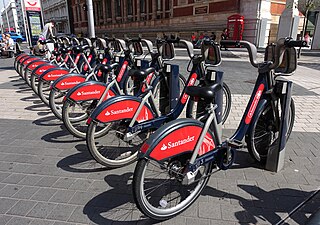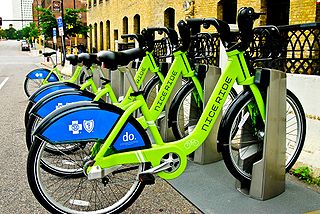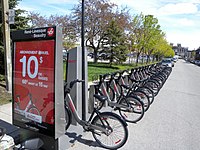
A bicycle-sharing system, bike share program, public bicycle scheme, or public bike share (PBS) scheme, is a shared transport service where bicycles are available for shared use by individuals at low cost.
Montreal has a developed transport infrastructure network, which includes well-developed air, road, rail, and maritime links to the rest of Canada, as well as the United States and the rest of the world. Local public transport includes a metro system, buses, ferry services and cycling infrastructure.
Robotics Design Inc. is a company that designs and builds modular robots, founded and incorporated in Montreal, Quebec, Canada, in 1997. The company produces mobile robots, robotic manipulators and manual arms as well as custom solutions using modular robotic technology. The company developed the BIXI bike dock, a public bike system, and the ADC, a deployable structure container for quick deployment of housing, hospitals and other buildings.

Santander Cycles is a public bicycle hire scheme in London in the United Kingdom. The scheme's bicycles have been popularly known as Boris Bikes, after Boris Johnson who was Mayor of London when the scheme began operating.

Nice Ride Minnesota was a seasonally operated nonprofit bicycle sharing system in Minneapolis and St. Paul, Minnesota based on the BIXI brand created by Public Bike System Company and first used in Montreal. Launched on June 10, 2010, it served over 10,000 trips in its first month and reached 100,817 rides in the first season of operation. The bicycles in the system are manufactured by Cycles Devinci. They are painted fluorescent green and include a cargo carrier and headlights. They receive daily maintenance, and are redistributed throughout the system via truck.

Capital Bikeshare is a bicycle-sharing system that serves Washington, D.C., and certain counties of the larger metropolitan area. As of January 2023, it had 700+ stations and more than 5,400 bicycles. The member jurisdictions own most of the equipment and have sourced operations to contractor Motivate International. Opened in September 2010, the system was the largest bike sharing service in the United States until New York City's Citi Bike began operations in May 2013.

Cycles Devinci is a Canadian bicycle manufacturer established in Chicoutimi, Quebec in 1987. In addition to a full line of road, mountain and hybrid bicycles, it also manufactures the BIXI-brand of bicycle used in bicycle sharing schemes in cities such as Montreal, Toronto and Minneapolis. In most cities, like Montreal, BIXI offers both normal and electric bicycles.

Bluebikes, originally Hubway, is a bicycle sharing system in the Boston metropolitan area. As of 2023, the system had deployed 480 stations with a fleet of over 5,300 bikes in the 10 municipalities it served. Bluebikes is operated by Motivate and uses technology provided by 8D Technologies and PBSC Urban Solutions for equipment. The bike share program officially launched in Boston as Hubway. From 2012 to 2021, neighboring municipalities of Brookline, Cambridge, Somerville, Everett, Newton, Arlington, Chelsea, Watertown, and Salem joined the system. By 2020, total annual members neared 23,000, and as of 2021, 14 million total rides have been taken.

Bixi is a public bicycle sharing system serving the metropolitan area of Montreal, Quebec, Canada.
Motivate LLC is a company based in New York City that services bicycle sharing systems and other urban services in North America.

Melbourne Bike Share was a bicycle-sharing system that served the central business district of Melbourne, Australia. The stations and bicycles were owned by the government and operated in a public–private partnership with RACV. Launched in 2010, the network utilized a system designed by Montreal-based PBSC Urban Solutions with 600 bicycles operating from 51 stations. Melbourne Bike Share was one of two such systems in Australia until the Victorian Government shut down the service on 30 November 2019.

Citi Bike is a privately owned public bicycle sharing system serving the New York City boroughs of the Bronx, Brooklyn, Manhattan, and Queens, as well as Jersey City and Hoboken, New Jersey. Named after lead sponsor Citigroup, it was operated by Motivate, with former Metropolitan Transportation Authority CEO Jay Walder as chief executive until September 30, 2018, when the company was acquired by Lyft. The system's bikes and stations use technology from Lyft.
Capital Bixi was a public bicycle sharing system serving Ottawa, Ontario and Gatineau, Quebec, Canada. Launched in June 2009, it was the second BIXI system worldwide after BIXI Montréal. Capital Bixi was run by the National Capital Commission, which sold the bike share program to CycleHop.

Divvy is the bicycle sharing system in the Chicago metropolitan area, currently serving the cities of Chicago and Evanston. The system is owned by the Chicago Department of Transportation and has been operated by Lyft since 2019. As of May 2023, Divvy was the largest bicycle sharing system by area in North America with a service area of 234 square miles. In August 2024, the 1,000th Divvy station opened as part of a citywide expansion of 400 new stations.

Bay Wheels is a regional public bicycle sharing system in California's San Francisco Bay Area. It is operated by Motivate in a partnership with the Metropolitan Transportation Commission and the Bay Area Air Quality Management District. Bay Wheels is the first regional and large-scale bicycle sharing system deployed in California and on the West Coast of the United States. It was established as Bay Area Bike Share in August 2013. As of January 2018, the Bay Wheels system had over 2,600 bicycles in 262 stations across San Francisco, East Bay and San Jose.

Bike Share Toronto is a bicycle-sharing system in Toronto, Ontario, operated by the Toronto Parking Authority (TPA). The system consists of over 9,000 bicycles and over 700 stations, and covers over 200 square kilometres in 21 of the 25 wards of the city, with plans to expand to the entire city by 2025.

Pronto Cycle Share, branded as Pronto!, was a public bicycle-sharing system in Seattle, Washington, that operated from 2014 to 2017. The system, initially owned by a non-profit and later by the Seattle Department of Transportation, included 54 stations in the city's central neighborhoods and 500 bicycles. Motivate operated the system, and Alaska Airlines was the program's presenting sponsor. On March 31, 2017, Pronto shut down operations, and disassembly of stations began, with the bicycles being offered to other cities that wish to start a similar system.
Lyft Urban Solutions, formerly PBSC Urban Solutions and originally Public Bike System Company, is an international bicycle-sharing system equipment vendor with their headquarters based in Longueuil, Quebec. The company develops bicycle-sharing systems, equipment, parts, and software, and sells its products to cities in Canada, the United States, the United Kingdom, Spain, Brazil and more. The company has sold about 280,000 bikes and 13,000 stations to 50 cities.

Biketown, also known as Biketown PDX, is a bicycle-sharing system in Portland, Oregon, that began operation on July 19, 2016. The system is owned by Portland Bureau of Transportation (PBOT) and operated by Lyft, with Nike, Inc. as the title sponsor. At launch, the system had 100 stations and 1,000 bicycles serving the city's central and eastside neighborhoods, with hopes to expand outward.

















